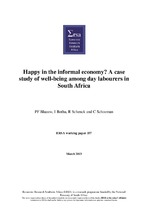| dc.contributor.author | Blaauw, Phillip (Derick) | |
| dc.contributor.author | Botha, Ilse | |
| dc.contributor.author | Schenck, Rinie | |
| dc.contributor.author | Schoeman, Christie | |
| dc.date.accessioned | 2016-04-04T10:16:58Z | |
| dc.date.available | 2016-04-04T10:16:58Z | |
| dc.date.issued | 2013 | |
| dc.identifier.citation | Blaauw, P., Botha, I., Schenck, R., Schoeman, C. etal. (2013). Happy in the informal economy? a case study of well-being among day labourers in South Africa. International Business & Economics Research Jnl, 12 (6): 1-28 | en_US |
| dc.identifier.issn | 1535-0754 | |
| dc.identifier.uri | http://hdl.handle.net/10566/2103 | |
| dc.description.abstract | Past research provided evidence of the negative effect that individual unemployment can have on subjective well-being. The persistent high levels of unemployment and poverty in South Africa have been well documented. Many people are forced into the informal economy, where they engage in a variety of survivalist activities such as day labouring. As no previous study has been conducted on the well-being of day labourers, the aim of this paper is to investigate the determinants of the well-being of South African day labourers. Objective and subjective functions are compared to determine the role of income and other variables in the wellbeing of day labourers. The determinants are categorised according to economic, comparison and attitudinal variables. The objective function uses income and the subjective function uses the binary measure of ‘experiencing a good week in terms of wages’ as dependent variables. The results showed that comparison variables are important determinants for the subjective measure of well-being, and attitudinal variables are important for the objective measure of well-being. The economic variables were important in both functions. The findings of this paper confirm other research findings showing that personal income is important for well-being in a poor community. The difference between these functions indicates that the subjective and objective measures of well-being both capture valuable characteristics of SWB in a poor community. | en_US |
| dc.language.iso | en | en_US |
| dc.publisher | Clute Institute | en_US |
| dc.rights | Copyright authors. The article is licenced under a Creative Commons copyright license policy, CC-BY | |
| dc.subject | Day labouring | en_US |
| dc.subject | Well-being | en_US |
| dc.subject | Happiness | en_US |
| dc.subject | Informal economy | en_US |
| dc.title | Happy in the informal economy? A case study of well-being among day labourers in South Africa | en_US |
| dc.type | Article | en_US |
| dc.privacy.showsubmitter | false | |
| dc.status.ispeerreviewed | true | |
| dc.description.accreditation | Department of HE and Training approved list | en_US |

